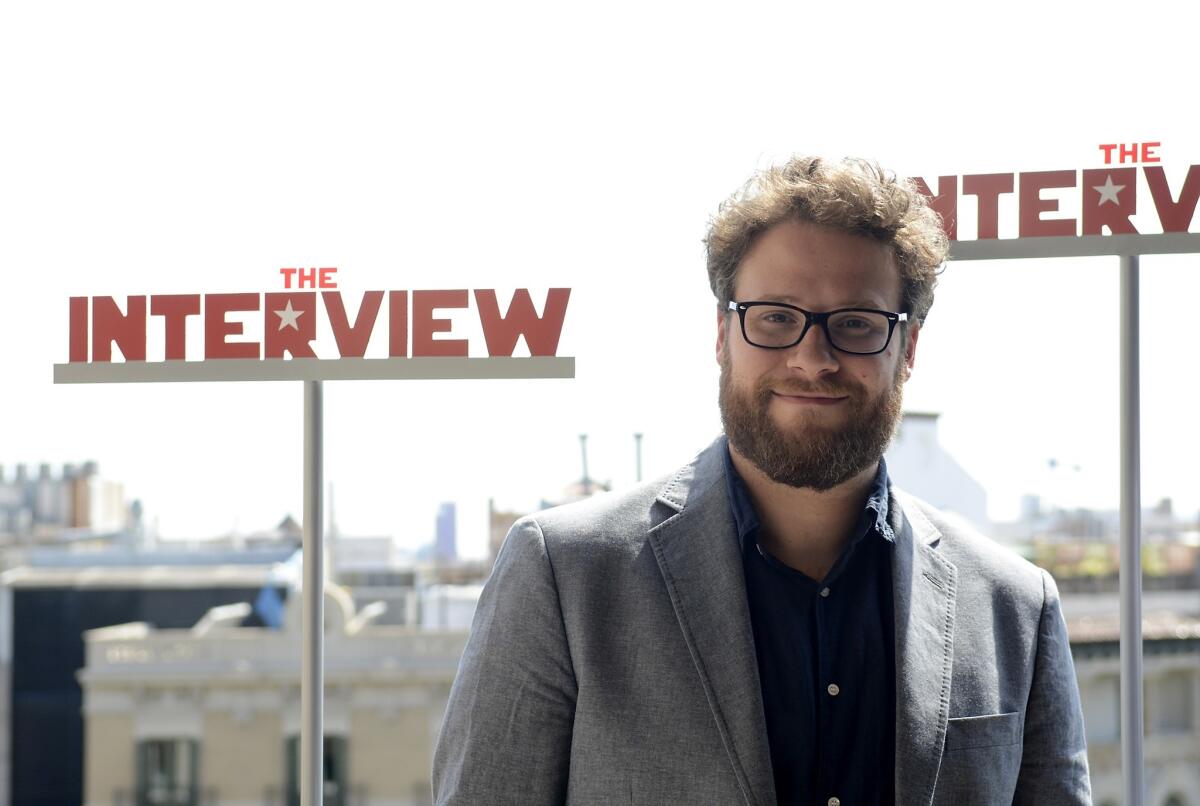North Korean protests create tricky PR situation for ‘The Interview’

- Share via
North Korean President Kim Jong Un is reported to be a major fan of NBA basketball and classic rocker Eric Clapton, but evidently he’s not big on Seth Rogen movies — or at least not ones in which he’s the butt of the joke.
On Wednesday, a spokesman for North Korea’s Ministry of Foreign Affairs said that the upcoming comedy “The Interview” — in which Rogen and James Franco play a talk show producer and host recruited by the CIA to try to assassinate Kim — was tantamount to an “act of war” and promised “a decisive and merciless countermeasure” if the U.S. government allows the film to hit theaters.
The threat certainly sounds alarming — that was clearly its intent — and navigating the controversy will require some delicacy on the part of Sony Pictures, which is releasing the movie on Oct. 10. On the one hand, the studio may not want to engage in a public feud with the North Korean leadership; on the other, the free publicity certainly doesn’t hurt.
The fact is, “The Interview” isn’t the first Hollywood comedy to spark an international incident. The 2004 all-puppet comedy “Team America: World Police” drew criticism from North Korea for portraying then-leader Kim Jong Il as a lonely, English-language-mangling despot who “was sent from the planet Xiron to conquer the Earf.” In that case, however, the country’s response was limited to an unsuccessful effort to get the film banned in the Czech Republic.
More recently, the 2006 cringe-comedy hit “Borat,” which starred Sacha Baron Cohen as a clueless, backward Kazakh TV reporter, drew official protests from the government of Kazakhstan as “a concoction of bad taste and ill manners … completely incompatible with the ethics and civilized behavior of Kazakhstan’s people.” The Kazakh Foreign Ministry threatened legal action against Baron Cohen and attempted to counter the negative image the film presented with its own PR campaign, taking out a four-page advertorial in the New York Times to highlight some of Kazakhstan’s cultural and natural wonders, boasting, for example, “The country is home to the world’s largest population of wolves.”
Thus far, the reaction to North Korea’s protests from Rogen, who co-wrote and co-directed “The Interview” with his partner Evan Goldberg, has consisted entirely of cheeky tweets. “People don’t usually wanna kill me for one of my movies until after they’ve paid 12 bucks for it,” Rogen wrote Wednesday morning to his 2.1 million Twitter followers. Sony has offered no official response to North Korea’s protests yet, and a source close to the project says that, for now, the plan is simply to wait and see how things shake out.
As the film’s release gets closer, though, it will be interesting to see if Rogen attempts to escalate matters in an effort to draw even more attention to the movie. That was certainly the strategy adopted by Baron Cohen in the run-up to “Borat.” Weeks before that film’s release, when Kazakh President Nursultan Nazarbayev went to Washington to meet with President Bush, Baron Cohen showed up as Borat outside the White House to publicly invite ‘’Premier George Walter Bush,’’ along with O.J. Simpson, Mel Gibson and “other American dignitaries,” to a screening of his movie. Rogen and Baron Cohen, coincidentally, share the same publicist.
Then again, Rogen and Sony may want to exercise a greater degree of caution in this case. After all, Kazakhstan has a whole lot of wolves, but North Korea may have nuclear missiles.
Follow @joshrottenberg for the stories behind Hollywood’s biggest movies.
More to Read
Only good movies
Get the Indie Focus newsletter, Mark Olsen's weekly guide to the world of cinema.
You may occasionally receive promotional content from the Los Angeles Times.











